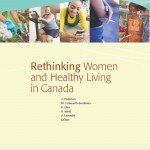A key challenge for the PhiWomen Team is the development of a framework to guide health promotion initiatives for women. The purpose of the framework is to help stakeholders in a variety of sectors (policy makers, health-care professionals, local decision makers, service providers, community organizations, consumer advocates, researchers and health-care payers) influence health promotion policy, practice and research by encompassing issues associated with sex, gender, diversity, and equity.
To achieve this, the PhiWomen team has collected evidence through systematic literature reviews and analyses of several case studies investigating various aspects of women’s health and health promotion initiatives. The team has conducted community-based, clinical and health services research in a variety of settings to help advance the framework development process.
Consultation on the Framework
In order to create a gender-transformative health promotion framework that will adequately address the needs of a diverse group of potential users the PhiWomen Team felt it necessary to solicit input from experts and potential users in the field of women’s health and health promotion. An initial consultation was held with our Australian partners at Women’s Health Victoria in Melbourne, Australia, during April of this year. We consulted with approximately 15 experts from across Victoria, Australia, including some leading thinkers in health promotion for women. They were extremely enthusiastic about the framework and made several suggestions about how to maximize its usability.
Between April 5th and June 5th, 2012 the Research Team engaged in a consultation consisting of three phases: I) expert interviews II) focus group web-meetings and an III) online survey.
Phase I: Expert interviews were conducted over a two month period (June 15th to August 15th, 2012). A semi-structured interview guide was designed and consisted of eight questions about the draft framework focusing on strength and limitations, applicability, usability, and gender transformative health promotion approaches. Key informants were selected based on their educational background and their expertise through working and teaching in the field of health promotion and/or gender studies. One hour, semi-structured, in-depth interviews were conducted with four key informants. With their consent, the interviews were recorded, transcribed, and analyzed. For the data analysis, a thematic analysis was conducted using NVivo 8.
Phase II: Five focus group web-meetings were conducted over the month of September, 2012. Focus group questions were similar to the semi-structured interview guide used in Phase I to maintain consistency. A list of user organizations was compiled and email invitations were sent out to a wide range of potential participants consisting of policy makers, health-care professionals, local decision makers, service providers, community organizations, consumer advocates, researchers, and educators. This phase was supported by a YouTube video explaining the framework in 6 minutes. The same data analysis plan for phase I was undertaken.
Phase III: An invitation to an online survey was widely disseminated to women’s health and health promotion listservs and on Twitter . The survey questionnaire consisted of a series of open-ended and closed-ended questions based on the questionnaire used for Phase I and II to maintain consistency. The YouTube video was available online. The survey was open for two weeks and we had a total of 270 respondents. For the data analysis plan, the closed-ended questions will be analyzed using SPSS and for the open-ended questions will apply the same data analysis plan as was used for Phase I & II.
All of these data sources are being integrated and considered by the PhiWomen team and we are now in the process of finalizing the Framework and Tool documents. We wll aslo be presenting on our work in October 2012 at the Montreal conference of the Institute of Gender and Health (IGH), Canadian Institutes of Health Research (CIHR).
Publications
Young, L. E., Pederson, A., Greaves, L., Long, P. M., & Gelb, K. (2011). Women’s health promotion: A framework for action. International Journal of Evidence-based Health Care, 9(3), S333-334.
Ponic, P., & Frisby, W. (2010). Unpacking assumptions about inclusion in community-based health promotion: Perspectives of women living in poverty. Qualitative Health Research, 20(11), 1519-1531.
